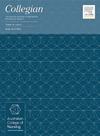Research activity among the Australian nursing and midwifery academic workforce: A cross-sectional study
IF 1.7
4区 医学
Q2 NURSING
引用次数: 0
Abstract
Background
Research in nursing and midwifery continues to grow and inform evidence-based practice. However, intentions to pursue an academic research pathway and heavy teaching workloads impede research outcomes in academia, with the nursing and midwifery academic workforce being at particular risk.
Aim
Determine research activity among the nursing and midwifery academic Australian workforce and explore how academic roles, qualifications, tenure, and workload profiles influence research engagement, productivity, and outcomes.
Methods
An online survey was circulated throughout Australian universities, social media platforms, and professional websites. Data were analysed using descriptive and inferential statistics.
Results
Of the 250 respondents, the majority (n=164) were research-active and were employed in blended teaching and research roles (n = 126). Tenured academics reported a significantly higher rate of research-active status (p ≤ 0.001). The mean number of papers published in the previous 12 months was 3.31 (Standard Deviation [SD] 2.28), with a career mean of 26.47 (SD 46.25). Respondents who were research active were engaged in Higher Degree Research (HDR) supervision, and research-active academics were more likely to apply for and be successful in grant outcomes (p<.001); however, they had lower levels of satisfaction with workload.
Discussion
Job security through tenure is significantly associated with research activity, indicating that research productivity may be lost through non-tenured positions. Whilst research-active respondents were engaged in HDR supervision, which is essential for workforce growth and scholarship, a significant portion were not, placing the workforce pipeline at risk.
Conclusion
Research activity in academia is essential for tenure and to support evidence-based practice. By fostering enabling research environments, the contribution of nursing and midwifery academics to support evidence-based practice and scholarship can be enhanced.
澳大利亚护理和助产学学术人员的研究活动:一项横断面研究
护理和助产学的研究持续增长,并为循证实践提供信息。然而,追求学术研究途径的意图和繁重的教学工作量阻碍了学术界的研究成果,护理和助产学学术人员尤其面临风险。目的确定澳大利亚护理和助产学术人员的研究活动,探索学术角色、资格、任期和工作量概况如何影响研究参与、生产力和结果。方法在澳大利亚各大学、社交媒体平台和专业网站进行在线调查。数据分析采用描述性和推断性统计。结果在250名受访者中,大多数(n=164)是研究活跃的,并且从事混合教学和研究角色(n= 126)。终身制学者报告的研究活跃状态率显著较高(p≤0.001)。前12个月平均发表论文数3.31篇(标准差[SD] 2.28),职业生涯平均发表论文数26.47篇(SD 46.25)。研究活跃的受访者从事高等学位研究(HDR)监督,研究活跃的学者更有可能申请并成功获得资助结果(p<.001);然而,他们对工作量的满意度较低。通过终身职位获得的工作保障与研究活动显著相关,这表明非终身职位可能会失去研究生产力。虽然积极从事研究的受访者参与了HDR监督,这对劳动力增长和奖学金至关重要,但很大一部分受访者没有,这使劳动力渠道面临风险。结论学术界的研究活动对终身教职和支持循证实践至关重要。通过营造有利的研究环境,可以加强护理和助产学学者对支持循证实践和学术的贡献。
本文章由计算机程序翻译,如有差异,请以英文原文为准。
求助全文
约1分钟内获得全文
求助全文
来源期刊

Collegian
NURSING-
CiteScore
2.70
自引率
6.70%
发文量
127
审稿时长
72 days
期刊介绍:
Collegian: The Australian Journal of Nursing Practice, Scholarship and Research is the official journal of Australian College of Nursing (ACN).
The journal aims to reflect the broad interests of nurses and the nursing profession, and to challenge nurses on emerging areas of interest. It publishes research articles and scholarly discussion of nursing practice, policy and professional issues.
Papers published in the journal are peer reviewed by a double blind process using reviewers who meet high standards of academic and clinical expertise. Invited papers that contribute to nursing knowledge and debate are published at the discretion of the Editor.
The journal, online only from 2016, is available to members of ACN and also by separate subscription.
ACN believes that each and every nurse in Australia should have the opportunity to grow their career through quality education, and further our profession through representation. ACN is the voice of influence, providing the nursing expertise and experience required when government and key stakeholders are deciding the future of health.
 求助内容:
求助内容: 应助结果提醒方式:
应助结果提醒方式:


